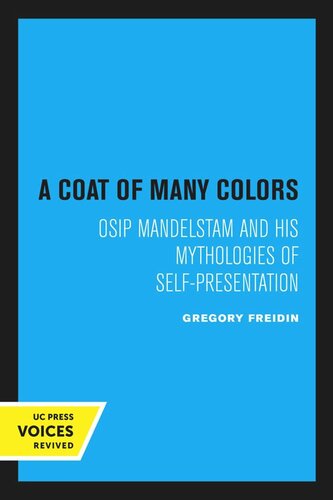

Most ebook files are in PDF format, so you can easily read them using various software such as Foxit Reader or directly on the Google Chrome browser.
Some ebook files are released by publishers in other formats such as .awz, .mobi, .epub, .fb2, etc. You may need to install specific software to read these formats on mobile/PC, such as Calibre.
Please read the tutorial at this link: https://ebookbell.com/faq
We offer FREE conversion to the popular formats you request; however, this may take some time. Therefore, right after payment, please email us, and we will try to provide the service as quickly as possible.
For some exceptional file formats or broken links (if any), please refrain from opening any disputes. Instead, email us first, and we will try to assist within a maximum of 6 hours.
EbookBell Team

0.0
0 reviewsFor the major poets of Osip Mandelstam's generation, poetry represented a calling in the most tangible sense. To respond to it meant to fashion from the available cultural and personal material a mythic self, one that could serve both as the organizing subject for poetry and as an object of worshipful adoration. A successful poet like Mandelstam thus became the focal point of a complex cultural phenomenon-perhaps a charismatic cult-that shaped his writings, gesture, and reception. Gregory Freidin examines Mandelstam's legacy in this broader context and lays the groundwork for approaching modernist Russian poetry as a charismatic institution. He traces the interplay of poetic tradition, personal background, historical events, religious culture, and political developments as they entered the symbolic order of Mandelstam's art and helped determine its outlines in the reader's imagination. Many important aspects of the Mandelstam phenomenon, including the Jewish theme, the meaning of the poet's Christianity, his political stand, and, in particular, his conflict with Stalin and Stalinism, receive here a new interpretation. A case study in the emergence of a literary cult, A Coat of Many Colors reveals how Russian poetry of the early twentieth century functioned as a charismatic institution of a distinctly modern kind. Those who belonged to it combined knowledge of the recent studies in myth, magic, and religion with the cultivation of verbal magic, mythic consciousness, and unorthodox religious beliefs. Following Mandelstam's career over its entire span (1908-1938), Freidin shows how the poet benefited from literary scholarship, comparative mythology, the history and sociology of religion at the same time he was emulating in his poetry the very subject of these academic disciplines. To account for this duality in interpreting Mandelstam's writings, Freidin draws on explanatory paradigms of contemporary human sciences, from Saussure and the Formalists to Weber, Durkheim, Freud, and Marcel Mauss.